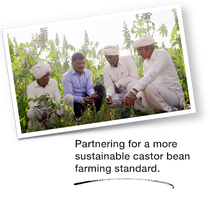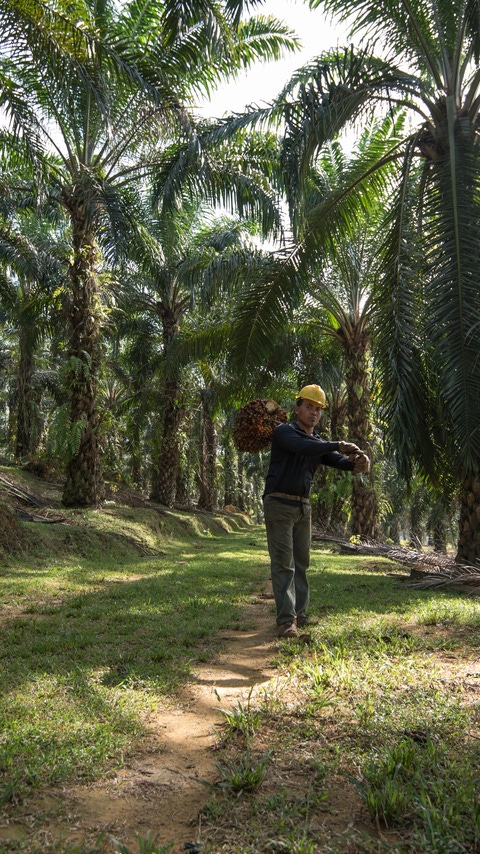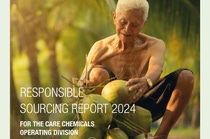Responsible sourcing:
We care about sustainable supply chains
Sustainability begins at the source and carries through along the entire value chain, so responsible sourcing is a key element of our sustainability strategy. BASF sources a wide range of raw materials, technical goods, and services. Our suppliers are an important part of our value chain, and together we are committed to increasing the share of renewable ingredients in our portfolio. We are also driven to improve sustainability in the supply chain and minimize risks. We are actively engaged in a range of initiatives to foster sustainable farm practices and enhance the wellbeing of farmers and workers.

Sustainable palm oil
Palm oil, palm kernel oil, and their respective derivatives are valuable raw materials for home and personal care ingredients. However, oil palm plantations can contribute significantly to deforestation and loss of biodiversity, and the draining of peat soils to grow palm is a further factor in climate change. BASF joined the Roundtable on Sustainable Palm Oil (RSPO) in 2004 to address these issues. Since then, we have actively participated in consultations within the organization.
Two of our main renewable raw materials are palm oil and palm kernel oil, along with their derivatives. We primarily use these to produce ingredients for home and personal care products, with some being used for food ingredients. Oil palm plantations can have a significant impact on deforestation, loss of biodiversity and climate change from the loss of peatland. We share the widespread concern about these challenges and are committed to reducing our environmental impact.
As one of the leading processors of palm (kernel) oil within the Home and Personal Care Industry, we constantly demonstrate our progress on our journey toward sustainable oil palm products.
It is our primary concern is to ensure that our products are produced from sustainably sourced palm products. We take responsibility for working closely with the companies from which we buy raw materials, engaging more closely with the palm supply chain from smallholders to end consumers, and addressing the consequences of using and selling products containing on palm oil and palm kernel oil.
Check here for the latest figures and more information on our entire sustainable palm strategy: Sustainable Palm Oil

Sustainable coconut oil
Coconut oil is a vital feedstock for the chemical industry. BASF uses coconut oil to manufacture ingredients for products like cosmetic products, detergents and cleaning agents.
BASF is one of the first chemical companies to offer sustainable ingredients for personal care products made from Rainforest Alliance certified coconut oil. After successfully certifying our production site in Cassina Rizzardi, Italy, we have now certified another site in Zona Franca, Spain. This is a key step in ensuring our renewable-based products are made from sustainably sourced raw materials. The company is certified according to the Rainforest Alliance Mass Balance Coconut certification scheme.
Mass balance (MB) is a supply chain model that promotes the physical flow of certified raw materials within the supply chain. Farmers benefit by selling Rainforest Alliance Certified coconuts and copra.
Consumers are increasingly aware of environmental issues associated with coconut farming, and favor products based on sustainably sourced feedstocks.

Sustainable castor oil
Castor oil, derived from the castor bean, is an essential ingredient in a wide range of formulations. The oil and its derivatives are used as a raw material in the production of personal care applications, household cleaners, paints and pharmaceuticals.
We recognize the importance of not only striving to increase the share of renewables in our supply chains but also aiming to source feedstocks from sustainably grown plants – in line with BASF’s principles for the responsible sourcing of renewable raw materials
In response to a recognized need for sustainable castor cultivation, we launched the Sustainable Castor Initiative “Pragati” in 2016 together with partners Arkema, Jayant Agro-Organics, and the NGO Solidaridad.
The goal of Pragati is to enable sustainable castor crop cultivation by:
- Using good agricultural practices to increase yield and farmer income
- Efficiently using water resources and maintaining soil fertility
- Driving adoption of good waste management practices
- Enabling better health and safety practices and respecting human rights
The project is implemented in phases, beginning with a pilot in 2016, reaching village-level consolidation by 2019, and now in its third phase (2023–2026), with an expanded focus on supporting and increasing women’s participation in castor farming. In 2024, more than 1,100 women from 17 project villages enrolled in the program and received extensive training on good agricultural practices to enhance productivity and adopt sustainable, regenerative agriculture in a safe manner. All of them also took part in the program's digital and financial literacy module, resulting in improved financial and household decision-making.

Since the project’s inception, more than 10,000 farmers have been trained, and more than 8,000 of them have been certified.
More than 9,000 hectares are now regularly cultivated according to the sustainable castor guidelines.
Pragati farmers realized 57 percent higher yields than that published by the local government for the region in the year 8 of the project.
The practices adopted in the program have resulted in 33% lower water consumption compared with conventional practices and measured in the demonstration plots.
In the frame of Pragati initiative over 8,200 personal protective equipment kits and 5,500 crop protection storage boxes were distributed free of charge.
Pragati’s partners have founded the Sustainable Castor Association (SCA), in order to develop and implement the SuCCESS certification which stands for Sustainable Castor Caring for Environmental & Social Standards. The SuCCESS certification enables brands and manufacturers to source materials based on castor feedstock, grown in compliance with comprehensive social and environmental standards.
Following a successful audit of our supply chain by an independent certification body, BASF was the first chemical company to achieve SuCCESS certification at its Düsseldorf site in Germany in 2021. In addition, our sites in Ludwigshafen, Germany, and Guangzhou, China, were certified in May 2024.
As BASF, we are proud to offer SuCCESS-certified castor-based products to our customers. By choosing them, you support a supply chain that promotes responsible and effective agricultural practices, mitigates environmental impacts, and improves farmers’ safety and working conditions. Together, we can create high-performance solutions while driving positive impact for people and the planet.Sustainable rambutan
In response to growing consumer demand for sustainably sourced, natural cosmetics and in line with BASF’s commitment to sustainability goals, the company’s Care Chemicals division launched the Rambutan Program in 2014. Its objective: to explore the benefits and applications of the healthy superfruit, its husk and kernel, as well as other parts of the tree. The result is a wide range of renewable, natural ingredients.

The project, based in Vietnam, was preceded by research into the potential personal care benefits of extracts from different parts of the rambutan tree and its fruit. This was made possible in large part by BASF’s interdisciplinary innovation platforms for active ingredients, one of which focuses on the extraction of valuable components from plant material.
Rambutan (Nephelium lappaceum), native to the humid tropics of Southeast Asia, is closely related to the lychee and is cultivated primarily for its fruit. It has also been traditionally valued throughout Asia for various health benefits.
BASF’s Rambutan program, that aims to valorize the non-edible parts, respects the needs and interests of local ecosystems, as well as smallholders and workers. It helps protect biodiversity, while improving the livelihoods of local people involved in the cultivation and harvest.
Learn more about our sustainable rambutan strategy.

